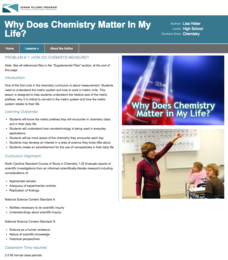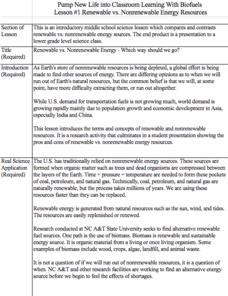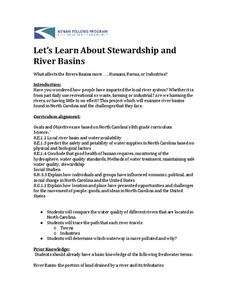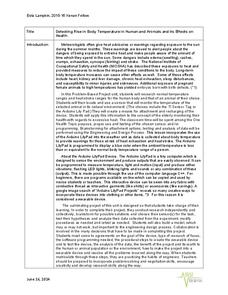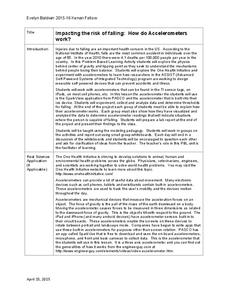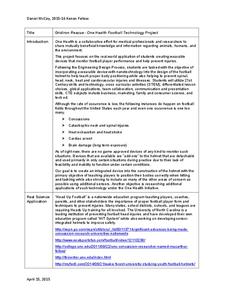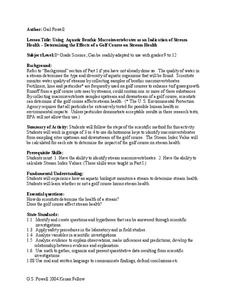Kenan Fellows
How Do Chemists Measure?
Young chemists create gold nanoparticles as they learn to measure accurately with the metric system. They create an advertisement for the application of nanotechnology to complete the first lesson in a series of six.
Kenan Fellows
An Analytical Chemist, a Biochemist, an Animal Scientist, and an Oncologist Walk into a Lab...No Joke
Oncology presents multiple opportunities for research and the collaboration of many different types of scientists. Scholars divide into groups and research the history of mass spectrometry, polarity/non-polarity,...
Kenan Fellows
Qualitative Kinetics: Examining the Effect of an Enzyme on a Reaction
Scholars learn about kinetics and buffers as they use qualitative and quantitative methods to understand enzyme rates and buffer capacity. The application of Beer's Law and spectrophotometry solidifies pupils' knowledge in the first of...
Kenan Fellows
Renewable vs. Nonrenewable Energy Resources
Is one type of energy inherently good or bad? Young scientists explore energy resources in a week-long unit. After extensive research, groups create powerful position statements and presentations supporting their energy resource of choice.
Kenan Fellows
Terrarium in a Bottle: Modeling the Atmosphere, Greenhouse Effect, and Water Cycle
You've heard of farm to table ... but what about farm in classroom? Junior agriculturalists embark upon a two-week journey into the science of growing things. Based upon the classic terrarium in a two-liter experiment, the lesson plan...
Kenan Fellows
Ready, Set, Save on Solar Energy Technology!
Does your class have a bright future in the solar energy industry? Science scholars take an in-depth look at what's new in solar technology. After completing research into the solar industry, participants create and market a product in...
Kenan Fellows
Sustainability: Learning for a Lifetime – The Importance of Water
Water is essential for life—and understanding the importance of clean drinking water is essential in understanding sustainability! Show your environmental science class the basics of water testing and treatment through a week-long...
Kenan Fellows
Let's Learn About Stewardship and River Basins
What does it mean to be a good steward? Middle school environmentalists learn to care for their state's waterways through research, a guest speaker, and poster activity. Groups must locate and learn more about a river basin and the human...
Kenan Fellows
The Little Stuff Can Make a Big Difference
Great things come in small packages! What better way to illustrate this point than a week-long look at nanotechnology? Earth science scholars explore water quality issues through lab activities, then research new innovations in nanotech...
Kenan Fellows
Farm to Fuel: The Alternative Fuels Industry
Need a lesson to fuel young minds? A variety of hands-on activities is sure to get your class fired up! Beginning with an introductory slideshow and culminating with group presentations, the week-long unit has something for everyone....
Kenan Fellows
Electricity: Sources, Usage, Challenges, and the Future
What does the future of energy look like? Junior engineers collaborate to discover a solution to the global energy crisis during a very hands-on lesson. The unit focuses on learning through collaboration to develop a deep understanding...
Kenan Fellows
Engineering Skills Through Problem Based Learning
Navigate the ups and downs of learning about energy. Future engineers consider how potential and kinetic energy apply to roller coasters. They design a roller coaster of their own and then use computer design software to showcase their...
Kenan Fellows
Detecting Rise in Body Temperature in Human and Animals and its Effects on Health
Beat the heat using sensors. Scholars research normal body temperatures for humans and a specific animal. In groups, they create sensors that monitor body temperature, as well as the weather. The goal is to reduce the occurrence of heat...
Kenan Fellows
Impacting the Risk of Falling: How Do Accelerometers Work?
Young engineers consider how to apply accelerometers and sensors to help prevent falls in elderly people. They consider forces of motion and gravity as part of the engineering design process.
Kenan Fellows
Gridiron Rescue: One Health Football Technology Project
Helmets not included! Scholars brainstorm adjustments and sensors to football helmets in an engineering design project to help prevent injuries, such as concussions and spinal injuries.
Kenan Fellows
Evaluating Sensors and the Impacts of Physiological Stress: Designing a Wearable Device for Rescue Workers
A long-term project has scholars consider ways in which sensors help monitor physiological stress levels of rescue workers. They design and create a portable device for this purpose. Techies to the rescue!
Kenan Fellows
Letter Writing to Politicians on Environmental Issues
Let your voices be heard! Pupils research local and national environmental concerns using the Internet. Class members determine an issue they deem important and draft a letter to a local politician expressing their concern about the...
Kenan Fellows
Determining the Effects of a Golf Course on Stream Health
Do golf courses affect the water organisms in nearby streams and ponds? Small groups collect samples of water upstream and downstream from a golf course and analyze the macroinvertebrates found and the stream index values of the two...
Kenan Fellows
Using Water Chemistry as an Indicator of Stream Health
Will this water source support life? Small groups test the chemistry of the water drawn from two different sources. They then compare the collected data to acceptable levels to draw conclusions about the health of the source. The...
Kenan Fellows
The Effects of Environmental Conditions on Aquatic Organisms
What kind of experiment can your class do to how observe the environment effects on organisms? Groups design and conduct lab experiments to learn about the effects of the environment on aquatic organisms. Based upon knowledge gained from...
Kenan Fellows
Microorganisms in Pond Water
That is living in the water? Groups of two to three view pond water with microscopes in order to find microorganisms. They draw pictures of the ones they find in their slides. The groups compare their drawings to pictures of common pond...
Kenan Fellows
Effects of a Golf Course on Stream Health
Is the golf course causing issues in the stream? Find out with a resource that has groups perform chemical water tests to analyze the effects of a golf course on a stream. Pupils collect water above and below the course and analyze the...
Kenan Fellows
Use of Dichotomous Keys to Identify Stream Organisms
What kind of organisms are living in the stream? After an explanation on how to use a dichotomous key, groups of three to four use the keys to identify macroinvertebrates from a local freshwater stream. Using the the concept of Stream...
Kenan Fellows
Assembly Required and the Design Process Too!
An engineering design lesson plan contains connected activities as a capstone engineering project. The activities revolve around the principle of improving an existing object and designing the manufacturing process in order to do so. The...


